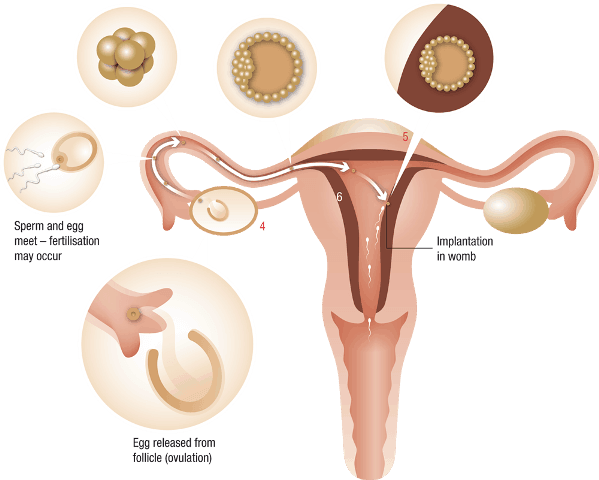Learn how long a period should last and other complicacy that you face during that duration.
In this article, I will draw a complete sketch of a perfect reproductive monthly cycle in a female. This is called menstruation cycle.
I will tell you about the issues that you may face during your cycles. Also, I will tell you about the do’s and don’ts of menstruation.
Table of Contents
How Long Dose Period Last?
Before I get into the depth, let me start with the basics.
What Is Menstruation?
 What Is Menstruation
What Is Menstruation
Menstruation is the phase in every female’s life when she bleeds through her vagina. It is the part of the cycle in which every fertile woman sheds the inner lining of her uterus.
It happens in every 28 days i.e. once every month. Here, the walls of her uterus get sloughed off when she does not conceive.
Along with the inner lining of her womb, her genitals also pass out blood. This flows right from the uterus to her cervix and then her vagina.
What Is A Menstrual Cycle?
The periodic occurrence of a woman’s vaginal bleeding once every month is her menstrual cycle. The cycle comprises of roughly 28 days.
However, the cycle can also vary from 21 to 35 days in an average grown adult. The first day of your menses is considered as the first day of the cycle.
If you have a regular cycle, this means that all your organs are working properly. This also marks the appropriate time for conceiving. This is regulated by the rise and fall of the hormonal levels in your body.
One of the chief hormones is estrogen. It plays a key role in maintaining your cycle. In the initial half of the cycle, the estrogen level slowly starts to rise.
This slowly thickens the wall of your uterus. The embryo will get attached to this thickened lining of your uterus. All the nutrition is supplied to the offspring through this lining.
In the first half of the cycle, one of your ovaries begins to mature, and the female sex cell starts growing. The female sex cell called the Ovum, leaves the ovary by the mid of the cycle and passes down to the uterus.
This is called the ovulation phase.
The First Period
Studies say; the average age that marks the start of the period in a girl is 13. That sure does not mean that every girl will start menstruating at the age of 13.
A girl can have her first period between the age group of 8 to 15. This solely depends on the maturity of her reproductive system along with her hormones.
This is very important to know that she must be taken to a doctor in case a girl fails to have her menses by the age of 15.
How Long Does A Period Last?
I already mentioned that you would lose your thickened uterine wall along with blood during your periods. The loss of blood may vary from person to person. This is called your menstrual flow.
The menstrual flow may vary every month depending on the amount of blood you are losing. The flow can be light to moderate or moderate to heavy depending on the intensity of your period.
The period may also range in between 3-5 days. A day or two may also be subtracted or added depending on the flow. Usually, when a girl starts to menstruate in her teenage, she may have longer periods.
With years passing by, you may notice that your periods have shortened by a day or two. This is normal, and there is nothing to be scared bout.
The Last Period
A woman can have her cycles until an age of 43-55 depending on her hormones. The offset of your periods is called as menopause.
Menopause is common in every fertile woman. It is the time of her life when she will stop ovulating. This marks the termination of her reproductive ability.
A woman is likely to experience minor to major changes during or after her menopause. These changes may be psychological or physical. You need to be extra cautious while you are reaching your menopause.
This is because; your body will experience a lot of hormonal alterations. This is called the menopausal transition. The transition can take place ranging from 2-8 years.
This may even get harmful if not attended properly. You must see a doctor if you are not menstruating for around figure of 90 days.
Initially, the doctor will diagnose you for pregnancy. If your results are negative, then he/she will proceed with further tests.
Issues Faced During Periods
Being a woman is a blessing. It is said that a woman is complete when she begins to menstruate. But there is a catch. You will have a downside to everything in this life. And, I am not exaggerating it.
There are some issues that a female needs to go through during her menses. Starting from heavy pain and flow to irregularities, you may face numerous issues because of your menstruation.
Listed below are some of the abnormalities that you are likely to experience during your period.
a.Amenorrhea
When you have regular periods, your body is working efficiently. This means your hormones are in sync, and your system is at peace.
But there are times when you may notice that you are not menstruating for a quite long time. This is called Amenorrhea. Young girls who have reached their age to menstruate but are not are also said to have this problem.
The causes of Amenorrhea are:
- Pregnancy or lactating phases
- Disturbance in diet
- Psychological or physiological stress
- Weight loss or gain
- Drugs and medicines
- Medical conditions which need treatment
b.Dysmenorrhea
Many women experience intense pain and cramps during periods. If you too are one of them, then you have dysmenorrhea.
This can have two reasons:
- In teens, it can be due to excess production of prostaglandin.
- In women, this occurs due to fibroids and endometriosis.
Usually, the pain due to dysmenorrhea can be cured by a warm water bath or hot water pads. Some ladies prefer going through pills if not benefited due to the warm baths.
But, I would suggest you see a doctor before choosing any such alternative. This can be harmful and can also deplete your health permanently.
c.Abnormal Uterine Bleeding
If you are bleeding through your vagina in either of the following cases then you are suffering from abnormal uterine bleeding:
- In between your periods.
- After mating.
- After your menses.
- After menopause.
There can be numerous causes that may lead you to this disorder. You must see a doctor if you notice such issues because this can be a chance of many other serious disorders like uterine fibroids or cancer.
d. Post Menstrual Stress
Postmenstrual stress is commonly known as PMS. This is usually seen in teens just before the onset of their periods. The symptoms of PMS are:
- Breast tenderness
- Mood swings
- Anxiety
- Insomnia
- Food cravings
These symptoms slowly fade away as the period marks its onset. There are few problems with PMS that may affect your personal life.
You may appear cranky during those days, and it can ruin a lot of things. What is best is to see a therapist if the conditions are serious.
How Can You Track Your Cycle?
It is very important that you keep a track of your cycle. I would advise you so because this can help you keep an eye on your health.
While checking your cycle, make sure you have a record of:
- The first day of your cycle.
- The final day of your cycle.
- The menstrual flow.
- Pain experienced.
- IF the bleeding is normal or not.
- Mood swings like stress and irritation.
You must always have a record of your cycle because it can decide a lot about your health. If you fail to keep a track of the dates, then you can also make use of the technology.There are some smartphone technologies that can help you with it. They are all free of cost and very user-friendly.
Is Missing A Period Normal?
Missing a period can be the result of many reasons. If you have any of the following then you may skip a period:
- If you are ill.
- If you are underweight.
- Stressed, both psychologically or physically.
- If you are on medication.
Whatever may the cause be, you must not be reluctant about it. In case the dates of your period are long past, please see a doctor.
When Shall You See A Doctor?
You should be extra cautious when you are talking about your period. There can be multiple causes that can bring a matter of concern for your menstrual cycle. These are called the menstrual irregularities.
In case, you are experiencing menstrual irregularities; you must know what can be the causes behind them.
Listed here, are a few reasons that can fetch you irregularities during your menses:
- If you are pregnant or lactating.
- If you have a polycystic ovary syndrome.
- If you are careless with your diet and weight.
- If you have uterine fibroids.
- If you suffer from ovarian failure.
The point is how you will know you that you are suffering from these irregularities.
If you notice that you are:
- 15 and not menstruating yet.
- 13 and still there is no development with your breasts.
- Having well-developed breasts but still not menstruating.
- Not menstruating for a tenure of 90 days or more.
- Witnessing irregular periods after a long duration of regular cycles.
- Having a cycle not ranging in between 21-35 days.
- Bleeding more than a week.
- Bleeding profusely which is not usual for your menstrual flow.
- Noticing loss of blood in between your menstrual dates.
- Experiencing acute pain during your menses.
- Struck by fever or illness after the usage of tampons.
If you are going through even one of them, please see your gynecologist as soon as you can. You must not be reluctant with your cycle. A disturbed cycle can lead to many unwanted issues.
How To Prevent These Irregularities?
Having a normal cycle can help you stay healthy and happy. This notifies you that you have a safe and healthy system. Here are a few tips that might help you beat your menstrual irregularities:
- Always eat fresh and healthy.
- Try to be extra cautious while checking your system.
- Maintain the healthy heat regulation of your body.
- Drink ample of water.
- Try adding the practice of working out in your daily schedule.
Few women also prefer to take birth control pills for having a healthy menstrual cycle. What I would personally ask you is to see a healthcare professional before doing so.
Points To Remember
Well, I am done telling about most of the things that you must know about your periods. I am left with only one thing now. Here are some essential points that you must know about your menses.
Don’t worry I am not going to ask you for some tough job.
These are few guidelines that will help you stay healthy during and after your menstruation.
- Use sanitary pads or tampons in place of napkins.
- Change your pad once every 3 hours. Depending on your flow you may also have to change it more frequently.
- See that your pad doesn’t get fully soaked in the blood.
- If you are using a tampon, then you may use it for 5-6 hours.
- Try to use tampons with the minimum absorbing capacity on days when your flow is light. Usage of a high absorbing tampon may increase the amount of toxins in your body.
- This can end you up having Toxic Shock Syndrome (TSS).
What Is TSS?
TSS is a very rare disease, but it is also very deadly at the same time. TSS is born due to toxin-producing bacteria, and it attacks your immune system.
Let me tell you about some of the symptoms of Toxic Shock Syndrome:
- Sudden and very high fever.
- Muscle cramps.
- Weakness or dizziness.
- A sore throat and sneezes.
- Diarrhoea.
- Frequent vomiting.
- Rashes.
- Bloodshot eyes.
If you witness any of the above, then get rid of your tampon and see a doctor as soon as possible.
Bottom Line
Every female body starts to develop her reproductive organs by the end of her first decade. When she hits puberty, her body experiences some changes. This is due to the hormones in her system.
Mostly, by the age of 15, every girl experiences her first period. In technical terms, it is known as menstruation. Menstruation is a blessing to every girl.
This lasts for almost 30-35 years of her life. But often this blessing can bring along with it some downsides. You may face some issues if your cycles are not running properly.
However, these things can be taken care of, provided that you seek medical advice at the proper time. Make sure you are never reluctant about your menses.
Be extra cautious with your hygiene and health when in the period. Hope you have a healthy cycle.






